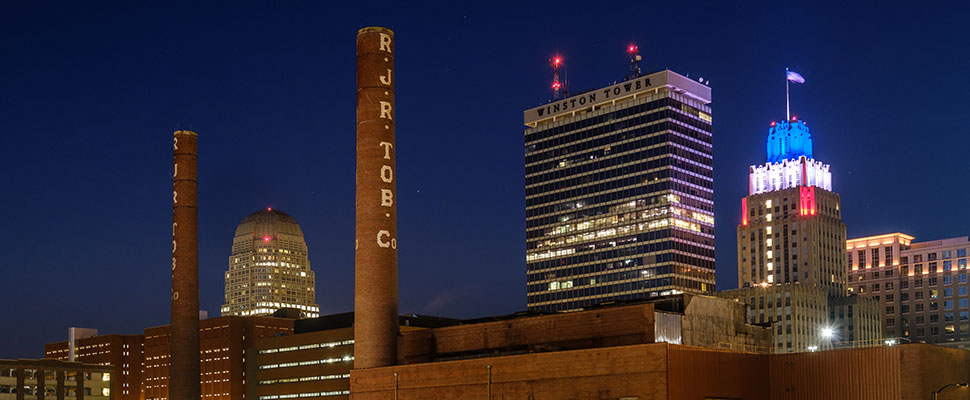WFU embarks on new era as Wake Downtown classes begin in the Innovation Quarter
Wake Downtown classes begin Tuesday, Jan. 10, marking the beginning of an historic era for Wake Forest University as it moves undergraduate courses into Wake Forest Innovation Quarter in downtown Winston-Salem.
The new academic programs in engineering and biomedical sciences were announced last year. About 275 students are enrolled in 18 classes, a mix of science courses, labs and liberal arts courses such as historic preservation, community engagement and a first-year seminar exploring the analytical methods of Sherlock Holmes.
The University’s undergraduate presence, referred to as Wake Downtown, opens in the rehabilitated former R.J. Reynolds Tobacco Company 60 series building in the Innovation Quarter, adjacent to the Bowman Gray Center for Medical Education.
“When we look back at the major milestones in Wake Forest University’s history, I think this will rise to the top.” Nathan O. Hatch, president
“Our intent is to create opportunity and prepare our students to thrive in an unpredictable and dynamic world,” said Hatch. “Through Wake Downtown, we hope to reinforce our ideals of teamwork, entrepreneurship, creativity and Pro Humanitate.”
New course offerings and the new location will extend the exceptional faculty-student engagement that is a hallmark of the Reynolda Campus to one of the fastest-growing urban-based districts for innovation in the country to meet employer, student and societal demands.
“This is a new era for Wake Forest and an opportunity to leverage our relationship with the medical school and distinguished faculty in rapidly advancing fields like biomedical science.” Provost Rogan Kersh
Wake Downtown Quick Facts
New courses of study include:
 B.S. in Biochemistry and Molecular Biology – Jointly offered by the Chemistry and Biology departments, this interdisciplinary degree will enable students to develop a conceptual understanding of and build practical skills to address increasingly complex biological, biochemical and biomedical challenges. (Beginning Jan. 2017)
B.S. in Biochemistry and Molecular Biology – Jointly offered by the Chemistry and Biology departments, this interdisciplinary degree will enable students to develop a conceptual understanding of and build practical skills to address increasingly complex biological, biochemical and biomedical challenges. (Beginning Jan. 2017) Concentration in Medicinal Chemistry and Drug Discovery – Within a chemistry major, provides a new path to an American Chemical Society certified B.S. degree for students interested in health-related fields, biomedical sciences and pharmacology. (Beginning Jan. 2017)
Concentration in Medicinal Chemistry and Drug Discovery – Within a chemistry major, provides a new path to an American Chemical Society certified B.S. degree for students interested in health-related fields, biomedical sciences and pharmacology. (Beginning Jan. 2017) B.S. in Engineering – Set in a liberal arts environment, the engineering major will graduate students to be leaders, not just doers, by infusing design with teamwork and entrepreneurship. An optional emphasis in biomedical engineering will be offered. (Beginning Fall 2017)
B.S. in Engineering – Set in a liberal arts environment, the engineering major will graduate students to be leaders, not just doers, by infusing design with teamwork and entrepreneurship. An optional emphasis in biomedical engineering will be offered. (Beginning Fall 2017) Minor in Biomaterials Science – Designed in consultation with faculty from Wake Forest Institute of Regenerative Medicine (WFIRM), this minor will introduce students to the cutting-edge ways researchers study and mimic biological materials such as bone, soft tissue and muscle. (Beginning Fall 2017).
Minor in Biomaterials Science – Designed in consultation with faculty from Wake Forest Institute of Regenerative Medicine (WFIRM), this minor will introduce students to the cutting-edge ways researchers study and mimic biological materials such as bone, soft tissue and muscle. (Beginning Fall 2017).
Wake Downtown space:
A total of 115,000 square feet of space on five floors has been developed into state-of-the-art classrooms, teaching and research labs, offices and other support spaces. Students will have quiet study and gathering spaces on each floor. Some faculty will have permanent offices, while those commuting more often between campuses will have touchdown workspaces.
- 5 classrooms with movable furniture to facilitate small groups
- 10 teaching labs
- 7 research labs and support space
- 4 conference rooms
- 1 auditorium
- 1 boardroom with downtown view
- 1 meditation room
- 35 faculty and administrative staff offices
Courses offered:
Wake Downtown will be home to a diverse set of classes. Eighteen courses from nine college departments will be taught in Spring 2017. Science classes include molecular biology, organic chemistry, biochemistry offerings, three lab courses, five humanities courses and one first-year seminar. Additional courses of interest include but are not limited to:
- Studies in Historic Preservation – Taught by history professor Tom Frank, this class will take advantage of the historic downtown setting when examining the history of public movements for historic preservation in the United States and other nations.
- Community Engagement: The Role of Universities – Co-taught by Provost Rogan Kersh and Corey D. B. Walker, dean of Winston-Salem State University, this course will bring together students from WFU and WSSU each week to explore the impact of higher education on societal change.
- Literacy in the 21st Century – Taught by Alan Brown, director of English education, this course examines the impact of emerging literacy trends on 21st century students in a digital, global world with specific focus on engaging reluctant and struggling readers.
- Drug Discovery and Design – Taught by adjunct biochemistry professor Roy Hantgan, now retired from the School of Medicine, this graduate level course will also be available to some undergraduate students interested in medicinal chemistry.
- Bioinspiration and Biomimetics – Taught by biology professor William Conner, this course is an interdisciplinary entrepreneurship and biology course that applies biological methods and systems to the study and design of new products and services – from ideation to business plan development.
- First-year seminar – Taught by Dean of the Graduate School of Arts and Sciences, Brad Jones, this popular course, The Analytical Methods of Sherlock Holmes, teaches critical thinking and argument analysis.
- Creativity and Innovation – Offered in two sections and taught by visiting assistant professors of entrepreneurship Jan Detter and Lynn Book, this dynamic seminar is designed to introduce students from every discipline to cross-disciplinary creative processes and principles and engage them in developing a “critical creativity” that links inquiry to innovative project development.
- Practices of Citizenship – Taught by associate professor of communication Alessandra Von Burg, this course explores the history and theory of citizenship with a focus on the role of discourse, invention and imagination in the making of citizens.
Shuttle service:
Shuttle service from Benson Center on the Reynolda Campus to Building 60/Wake Downtown on Vine St. will be provided Monday through Friday from 8 a.m. to 11 p.m. and weekend service from 10 a.m. to 6 p.m. Two shuttles will run in 15 minute intervals on the quarter hour mark to ensure that faculty and students can easily travel between both locations. A third bus will run during peak ridership periods.
These shuttles are in addition to the Innovation Quarter/Brookstown shuttle that the University already runs from 7:30 a.m. to 5:50 p.m. in 30 minute intervals.
Security:
- 24/7 security presence with after-hours, on-call security assistance available
- University Police present during business hours
- All faculty, staff, and students will display University-issued DeaconOne cards while in Wake Downtown facilities

Categories: Admissions, Faculty, Provost, Research, Staff, Student, Top Stories


